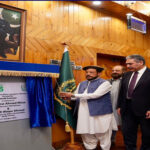GILGIT:Pakistan will continue to follow a “no-favourites, non-interference” policy for Afghanistan while drumming up support from all stakeholders for a peaceful transition in 2014, according to Sartaj Aziz.
HunzaNews February 10th, 2014.
Aziz, Adviser to the Prime Minister on National Security and Foreign Affairs, was speaking to the media on Sunday at the conclusion of a conference organised by the Regional Peace Institute (RPI), a Pakistani think-tank.
The conference focused on the future of Afghanistan from Pakistani and Chinese perspectives, especially in the light of an expected US and NATO troops withdrawal from the country by summer 2014.
Aziz said there has been a noticeable reduction in the hostility between Pakistan and Afghanistan over the past seven months. He said the reduction has resulted after Pakistan “convinced” Afghan officials that it will play no-favourites in the upcoming presidential elections and will not interfere in its internal affairs.
He said Pakistan had nothing to do with the Bilateral Security Agreement between the US and Afghanistan. Pakistan is focusing on managing its own border and it “will ensure that no such activity takes place (from within Pakistan) which disrupts the elections,” Aziz said.
Meanwhile, Pakistan is focusing on trade and connectivity with its western neighbour.
“Next month, we have joint committee meeting at the finance minister-level where the economic cooperation will be reviewed,” Aziz said.
Earlier, speaking as the chief guest, he highlighted the need for regional support to ensure a smooth transition in Afghanistan.
“Afghanistan’s neighbours and regional countries have a crucial role in helping to bring about a peaceful transition as foreign forces leave Afghanistan,” Aziz, who is Pakistan’s de-facto Foreign Minister, said.
He said Pakistan has taken several steps in response to the request by President Karzai and the Afghan Peace Council in facilitating reconciliation including the release of Taliban detainees.
He said he is confident that all stakeholders realize the “heavy cost” of potential instability and violence in Afghanistan for the region.
“Everyone must ensure that there is no repeat of what happened in the 90s” after the Soviet troops left, Aziz said.
Chinese and Pakistani speakers echoed the sentiments that the international community should keep supporting peace in Afghanistan and maintained that any turbulence in the country would affect the entire region.
The conference, titled “China, Pakistan and Afghanistan: Regional Perspectives, Future Prospects,” also featured representation from the Chinese non-profit think-tank Chinese People’s Association for Peace and Disarmament (CPAPD).
During two sessions dealing respectively with “US drawdown from Afghanistan” and “Prospects of Pakistan-China collaboration in Afghanistan,” speakers said Pakistan has been most affected by turmoil in Afghanistan. They said Pakistan and China have a shared interest in a stable Afghanistan.
Senator Mushahid Hussain and Lieutenant General (Retd) Talat Masood both said that Pakistan and China have a “core interest” in stability and security in Afghanistan.
Hussain said he believes the western countries still do not have an exit strategy for Afghanistan and “some of them are clueless” about the post-troops withdrawal scenario.
There was some disagreement over the utility of US maintaining a limited presence in Afghanistan.
Hussain said it would be a “recipe for sustained strife” and just a ploy to “keep an eye on Pakistan, China and Iran.” But some other speakers said a limited US presence can help Afghanistan through a sensitive transition.
CPAPD member Zhu Fagen said Afghanistan concerns quite a lot of countries and it is important that regional countries build a consensus on supporting Afghanistan.
Panelists said the projects such as China-Pakistan Economic Corridor and the Silk Road Economic Belt —a Chinese project that intends to connect countries of South and Central Asia along the ancient Silk Road —might pave the way for regional economic stability.Express






















